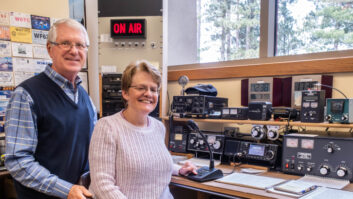XM and Sirius experiencing regulatory problems
Aug 1, 2006 12:00 PM, By Harry Martin
On May 22, 2006, XM Satellite Radio announced it would abandon its bid to acquire terrestrial Wireless Communications Service (WCS) frequencies due to failure to obtain FCC approval of the purchase. The WCS frequencies offered great promise to XM because the company could have provided broadcast-type local programming to 163 million people in the United States, including those in 15 of the top 20 markets in the country.
The NAB argued that XM should not be permitted to use the WCS frequencies to provide local radio programming and other specialized services on a market-by-market basis and sell them along with XM’s satellite radio service. In its filings the NAB insisted that, before approving the purchase, the FCC must consider the harm that XM could cause to traditional local radio stations. The matter had been pending for more than a year when XM pulled the plug in May.
The radio industry has fought for years to try to stop XM from adding localized terrestrial radio service to its complement of national satellite channels. Initially, XM sought to construct a network of terrestrial repeaters, ostensibly to fill in reception holes in urban areas. Radio broadcasters fought this plan at the FCC, saying that XM would use the repeaters to offer local programming. Recognizing the harm that an XM local radio service could have on local radio, in 2001 the FCC granted XM special temporary authority for the repeaters with the condition that the temporary facilities be used only for simultaneous retransmission of XM’s national satellite programming. With this avenue to local markets cut off, in July 2005, XM applied for FCC consent to acquire the terrestrial WCS frequencies.
More problems for satellite radio
Interference to FM reception There have been widespread complaints that some satellite radio receivers that use low-band FM frequencies to transmit the incoming satellite signal to on-board car radio receivers �bleed through� so that persons in nearby cars receive the signals intended for the subscriber’s car radio. Bleed-through is caused when the FM signal intended for the on-board radio travels along the car radio’s antenna connection wire and is broadcast from the receive antenna. Some car radios have been affected for one-quarter mile by such bleed-through. Local radio stations, including Christian stations sharing the satellite companies’ receiver frequencies, have complained to the FCC about their listeners receiving sexually explicit or otherwise indecent programs.
XM says it has modified the mini-FM transmitters in its satellite receivers to minimize bleed through, but Sirius refuses to acknowledge that its receivers cause bleed-through problems. XM was forced to ask suppliers of some XM receiver models to suspend shipments in May after the FCC found the receivers were not in compliance with emission limits. As of mid-June, the FCC’s test lab found that a new chip introduced by XM cured bleed-through by some of the company’s receivers.
Demand for regulatory parity In a recent letter to FCC Chairman Martin, the NAB pointed to the ubiquity of satellite radio programming as a result of promotion and marketing by XM and Sirius and that the satellite services for this reason should be made subject to the same regulatory scheme as broadcasters. For example, the NAB points out that satellite radios are available in cars from the major rental car companies. Also, satellite radios are installed in new cars at the factory, with car buyers receiving satellite radio programming for months without subscribing. Because this represents free distribution of the service the argument that the subscription model for the service should exempt it from content regulation, particularly the indecency rules, no longer has a legal basis.
FTC launches probe into XM marketing activities XM reported receiving a letter from the Federal Trade Commission (FTC) in April informing it that the FTC is investigating whether XM’s marketing activities, including billing and rebates, comply with federal laws, including the Telemarketing Sales Rule and the Truth In Lending Act.
Dateline
Oct. 2 is the deadline for radio stations in Iowa and Missouri to file their biennial ownership reports. Oct. 2 is the date on which radio stations in Alaska, Florida, Hawaii, Iowa, Missouri, Oregon, the Pacific Islands, Puerto Rico, the Virgin Islands and Washington must place their annual EEO reports in their public files and post them on their websites.
Martin is a past president of the Federal Communications Bar Association and a member of Fletcher, Heald & Hildreth, Arlington, VA. E-mail[email protected].












